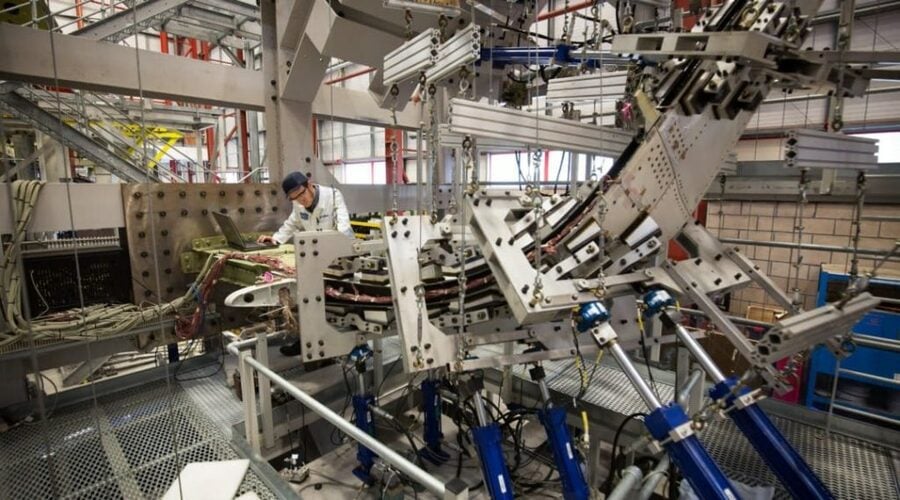A typical airframe fatigue test is divided in a number of fatigue load blocks. At the end of each flight block the test is stopped and the specimen is inspected for cracks. These manual inspections are time consuming and the time interval between these inspections is relatively large. Structural abnormalities may be detected too late, which could lead to retrofitting in-service aircraft in a worst-case scenario. Condition Based Inspections (CBI) of the specimen, instead of Risk Based Inspections (RBI), is a potential solution to reduce the total fatigue test duration and to quickly detect abnormalities. One of the implications is that more sensors are required to monitor the behaviour of the test specimen and to detect or predict structural failures.
“A full-scale airframe fatigue test can generate data at rates of up to 10 MB/s,
totalling to hundreds of terabytes at completion.
Data processing and analysis is a major bottleneck.”
Gantner Instruments has developed an innovative software platform, called GI.cloud, aimed at efficient processing of large volumes of measurement data and rapid analysis. GI.cloud combines a time series database management system with a powerful stream processing engine, offering a number of distinct advantages.
- Minimise your investment cost for IT and storage infrastructure in the test lab, whilst maintaining the necessary computing performance for test-critical data analysis tasks. Measurement data that you need to accessed right away (hot data) is available in the database. Data that you access less frequently, and is only needed for auditing or bookkeeping purposes (cold data), is kept in the stream processing platforms.
- Raw measurement data is safely stored in redundant, fault-tolerant clusters for automated backup. Flexible data aggregation ensures that your measurement data is continuous logged to the database at low sample rate. The database can replay the same data and store it at a higher sample rate in case detailed analysis around an unexpected event or specimen failure is required.
- Powerful querying capabilities enable you to analyse large amount of measurement data on-the-fly. Trend monitoring over the entire life of the fatigue test will quickly identify any significant change in strain between repetitive load conditions. Fatigue prediction and crack probability algorithms can identify possible loss of structural integrity during the test and immediately inform you when deviations occur.
Contact your local sales representative to learn more about GI.cloud.

More articles
IPERMON – Innovative Performance Monitoring System for Improved Reliability and Optimized Levelized Cost of Electricity
Currently, a vast amount of research institutions and organizations are focusing on ways to improve the operation, reliability and consequently the output of PV systems. An important aspect yet to be targeted remains the procedural and standardized approach to calculate accurately the factors behind the various performance loss mechanisms, while also detecting and diagnosing potential failures at early stages or before occurrence. Identification of degradation and failure modes at preliminary stages is important as these mechanisms directly influence the performance, lifetime and reliability of PV technology.
Read more...Innovative EIS Solution for Next-Generation Battery Storage Systems
Electrochemical Impedance Spectroscopy (EIS) is an analytical tool for anyone involved in the development, maintenance, and advancement of electrochemical systems like batteries, fuel cells, and electrolyzers. Understanding EIS and its benefits can provide a substantial edge in optimizing these systems’ performance and longevity.
Read more...GI.training in NRW in May 2026
We will be in North Rhine-Westphalia for the GI.basic training on May 12, 2026, and for the GI.professional training on May 13, 2026.
Read more...Designing SHM as Long-Term Measurement Infrastructure
Across the United States, bridges, tunnels, dams, and large industrial structures are being pushed beyond their original design life and asked to carry higher traffic volumes, heavier freight, and more frequent extreme events. At the same time, the U.S. regulatory and asset-management environment still depends heavily on periodic inspection programs and documented condition data.
Read more...
